- About
- Mission Statement
Education. Evidence. Regrowth.
- Education.
Prioritize knowledge. Make better choices.
- Evidence.
Sort good studies from the bad.
- Regrowth.
Get bigger hair gains.
Team MembersPhD's, resarchers, & consumer advocates.
- Rob English
Founder, researcher, & consumer advocate
- Research Team
Our team of PhD’s, researchers, & more
Editorial PolicyDiscover how we conduct our research.
ContactHave questions? Contact us.
Before-Afters- Transformation Photos
Our library of before-after photos.
- — Jenna, 31, U.S.A.
I have attached my before and afters of my progress since joining this group...
- — Tom, 30, U.K.
I’m convinced I’ve recovered to probably the hairline I had 3 years ago. Super stoked…
- — Rabih, 30’s, U.S.A.
My friends actually told me, “Your hairline improved. Your hair looks thicker...
- — RDB, 35, New York, U.S.A.
I also feel my hair has a different texture to it now…
- — Aayush, 20’s, Boston, MA
Firstly thank you for your work in this field. I am immensely grateful that...
- — Ben M., U.S.A
I just wanted to thank you for all your research, for introducing me to this method...
- — Raul, 50, Spain
To be honest I am having fun with all this and I still don’t know how much...
- — Lisa, 52, U.S.
I see a massive amount of regrowth that is all less than about 8 cm long...
Client Testimonials150+ member experiences.
 Scroll DownPopular Treatments
Scroll DownPopular Treatments- Treatments
Popular treatments. But do they work?
- Finasteride
- Oral
- Topical
- Dutasteride
- Oral
- Topical
- Mesotherapy
- Minoxidil
- Oral
- Topical
- Ketoconazole
- Shampoo
- Topical
- Low-Level Laser Therapy
- Therapy
- Microneedling
- Therapy
- Platelet-Rich Plasma Therapy (PRP)
- Therapy
- Scalp Massages
- Therapy
More
IngredientsTop-selling ingredients, quantified.
- Saw Palmetto
- Redensyl
- Melatonin
- Caffeine
- Biotin
- Rosemary Oil
- Lilac Stem Cells
- Hydrolyzed Wheat Protein
- Sodium Lauryl Sulfate
More
ProductsThe truth about hair loss "best sellers".
- Minoxidil Tablets
Xyon Health
- Finasteride
Strut Health
- Hair Growth Supplements
Happy Head
- REVITA Tablets for Hair Growth Support
DS Laboratories
- FoliGROWTH Ultimate Hair Neutraceutical
Advanced Trichology
- Enhance Hair Density Serum
Fully Vital
- Topical Finasteride and Minoxidil
Xyon Health
- HairOmega Foaming Hair Growth Serum
DrFormulas
- Bio-Cleansing Shampoo
Revivogen MD
more
Key MetricsStandardized rubrics to evaluate all treatments.
- Evidence Quality
Is this treatment well studied?
- Regrowth Potential
How much regrowth can you expect?
- Long-Term Viability
Is this treatment safe & sustainable?
Free Research- Free Resources
Apps, tools, guides, freebies, & more.
- Topical Finasteride Calculator
- Interactive Guide: What Causes Hair Loss?
- Free Guide: Standardized Scalp Massages
- 7-Day Hair Loss Email Course
- Ingredients Database
- Interactive Guide: Hair Loss Disorders
- Treatment Guides
- Product Lab Tests: Purity & Potency
- Evidence Quality Masterclass
More
Articles100+ free articles.
-
Cannabidiol (CBD) Increases Hair Counts By 246%? Not So Fast.
-
Creatine: Does It Worsen Hair Loss? It Depends On The Hair Loss Type.
-
Can Progesterone Improve Hair Regrowth?
-
CRABP2: Can This Gene Predict Regrowth From Retinoids?
-
BTD: Can This Gene Predict Regrowth From Biotin?
-
COL1A1: Can This Gene Predict Regrowth From Collagen Support?
-
2dDR For Hair Loss: What Do We Know So Far About This Sugar?
-
CYP19A1: Can This Gene Predict Regrowth From Hormone Therapy?
PublicationsOur team’s peer-reviewed studies.
- Microneedling and Its Use in Hair Loss Disorders: A Systematic Review
- Use of Botulinum Toxin for Androgenic Alopecia: A Systematic Review
- Conflicting Reports Regarding the Histopathological Features of Androgenic Alopecia
- Self-Assessments of Standardized Scalp Massages for Androgenic Alopecia: Survey Results
- A Hypothetical Pathogenesis Model For Androgenic Alopecia:Clarifying The Dihydrotestosterone Paradox And Rate-Limiting Recovery Factors
Menu- AboutAbout
- Mission Statement
Education. Evidence. Regrowth.
- Team Members
PhD's, resarchers, & consumer advocates.
- Editorial Policy
Discover how we conduct our research.
- Contact
Have questions? Contact us.
- Before-Afters
ArticlesSulfur (MSM) For Hair Loss: Do Studies Support Common Claims?
First Published May 8 2022Last Updated Oct 29 2024IngredientsNatural Remedies Researched & Written By:Perfect Hair Health Team
Researched & Written By:Perfect Hair Health Team Reviewed By:Rob English, Medical Editor
Reviewed By:Rob English, Medical Editor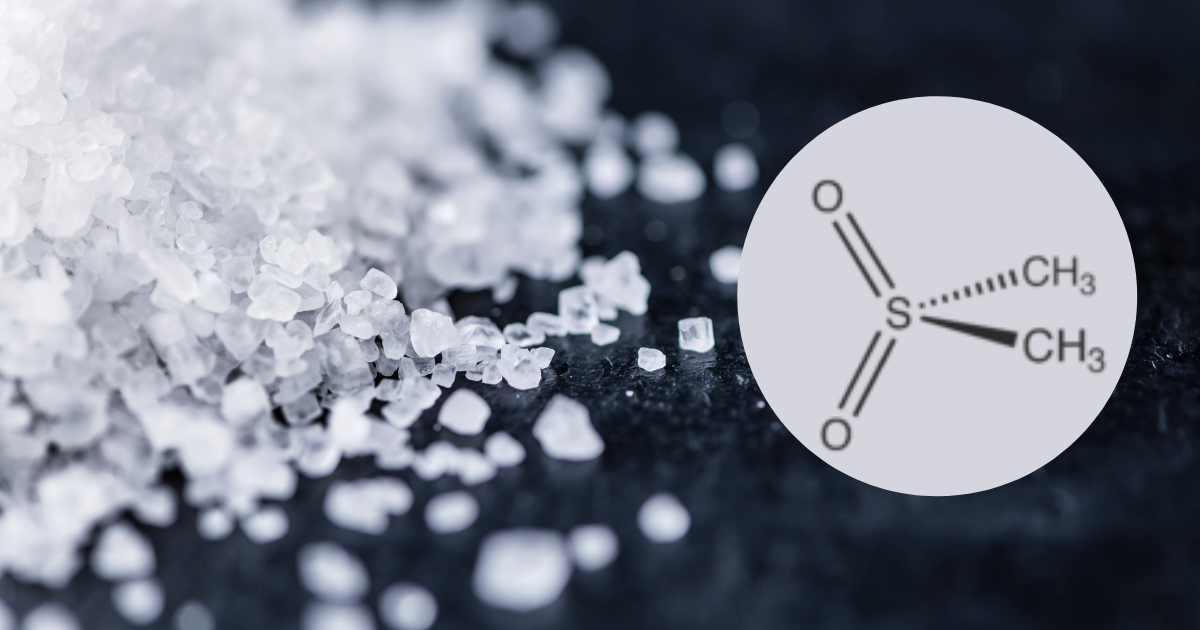
Want help with your hair regrowth journey?
Get personalized support, product recommendations, video calls, and more from our researchers, trichologists, and PhD's dedicated to getting you the best possible outcomes.
Learn MoreArticle Summary
Methylsulfonylmethane (MSM) has therapeutic benefits for those with metabolic issues, autoimmune disorders, environmental toxicities, and more. In recent years, it has gained popularity as a hair loss supplement. But little is known about its effects on human hair. There is no doubt that MSM can strengthen hair; however, that doesn’t necessarily mean it helps combat the miniaturization process of androgenic alopecia. This article investigates the research to support the use of MSM as a hair growth aid. Is the evidence strong enough to justify claims circulating online? The answers can be found below.
Full Article
Methylsulfonylmethane (MSM), is one of the most popular and well-researched sulfur-based supplements. MSM is often marketed as a hair growth aid – especially due to the popularity of other sulfur-based amino acids like L-cysteine. But is there clinical evidence to support this claim?
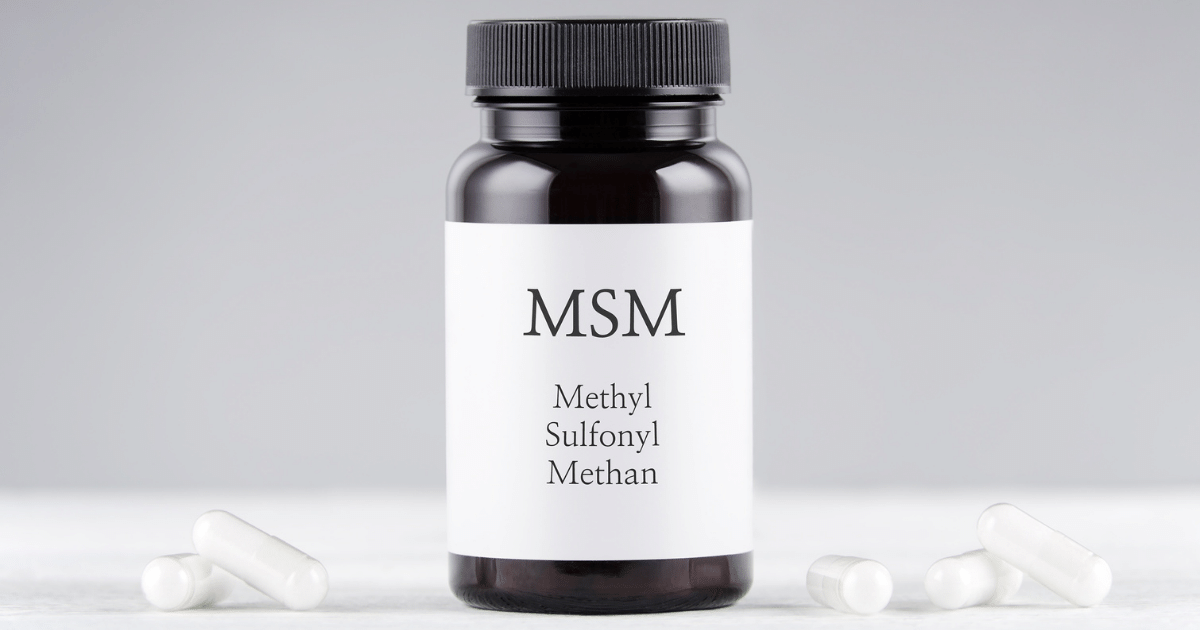
While MSM does show therapeutic benefits for those with metabolic issues, low-sulfur diets, or environmental toxicities, less is known about its effects directly on human hair follicles. This article explores how MSM works, if there is research to support its use as a hair loss supplement, and if that evidence is either strong or weak.
What Is MSM?
MSM is a combination of two compounds joined as one; methane and sulfate. Methane is a gaseous compound and sulfate is one of the key compounds within the human body that make up a majority of the matrix holding together endothelial cells.
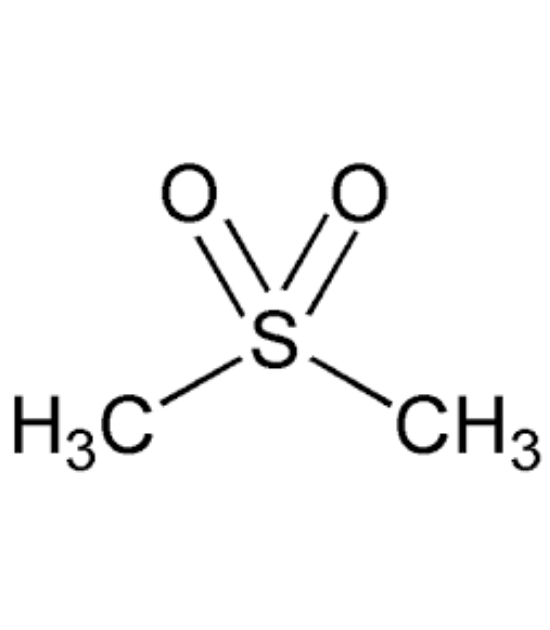
How is MSM related to health overall?
MSM was popularized as a health supplement after studies found that it might provide aid as a detoxifying compound and that MSM provides sulfate for the body to utilize for building proteins, collagen, bone, and other important tissues.
In fact, those familiar with minoxidil might be aware of one of the sulfur-based detoxification pathways inside the human body; the sulfotransferase enzymes.[1]https://www.ncbi.nlm.nih.gov/pmc/articles/PMC6699852/
These enzymes utilize sulfur and sulfate as a key to converting active compounds into inactive compounds, ready to be excreted. MSM can help to provide sulfate for this very purpose.
In general, MSM is a non-polar compound. It’s small enough that it is able to cross directly through cells, the brain, and even the nucleus, thereby altering DNA expression and reducing oxidative stress. This may promote broad anti-inflammatory effects that potentiate benefits for a variety of disease states and hair loss disorders – provided that the clinical evidence aligns with the suspected mechanisms (more on this soon).[2]https://www.ncbi.nlm.nih.gov/pmc/articles/PMC5372953/
Some of the pathways and enzymes by which MSM affects may also play a role in the hair loss process. These include, but are not limited to:
- COX1 and COX2: pathways involved in the oxidation of fats that produce prostaglandins.
- NF-κB: This is a pro-inflammatory factor that increases damaging cytokines.
- TNF-α: a cytokine that tends to tell cells to engage their self-destruct mechanisms.
- IL-6: an inflammatory signaling molecule.
- Prostaglandins: fatty acid derivatives created through COX pathways.
- And more…
MSM has also been shown to modulate key biochemical pathways that overlap with hair loss (specifically, alopecia areata and androgenic alopecia). Examples include the JAK/STAT pathway, which MSM may suppress (as seen in cell culture studies) – thus possibly having an ability to improve hair counts in those with autoimmune forms of hair loss.
Mast cells, which when hyperactivated contribute to the worsening of androgenic alopecia, are directly inhibited by MSM. And because of MSM’s ability to cross through most tissues (and accumulate in those tissues), MSM may provide support directly to the hair follicles.
But again, this all depends on whether in vitro studies are corroborated by in vivo studies (i.e., human trials).
What foods is it commonly found in?
People don’t necessarily need to supplement with MSM to acquire it. In fact, many of the foods consumed in the modern diet contain some amount of MSM.
Fruits, seeds (like coffee beans), vegetables, meat, animal milk, and tea are all sources of MSM. Plant sources of MSM vary widely depending on the content of sulfur in the soil as well.
The following is a list comparing the highest sources of MSM to lowest:
- Animal protein (including dairy).
- Sulfur-rich herbs and vegetables (such as onion and garlic).
- Cruciferous vegetables (like kale, broccoli, and cabbage).
In general, the higher the protein intake, the greater the amount of MSM to which the body will be exposed. This is also true for sulfur-rich essential- and conditionally essential- amino acids that make up the metabolites of MSM.[3]https://www.ncbi.nlm.nih.gov/pmc/articles/PMC2198910/[4]https://www.ncbi.nlm.nih.gov/pmc/articles/PMC5372953/
Why do people believe MSM / sulfur helps with hair growth?
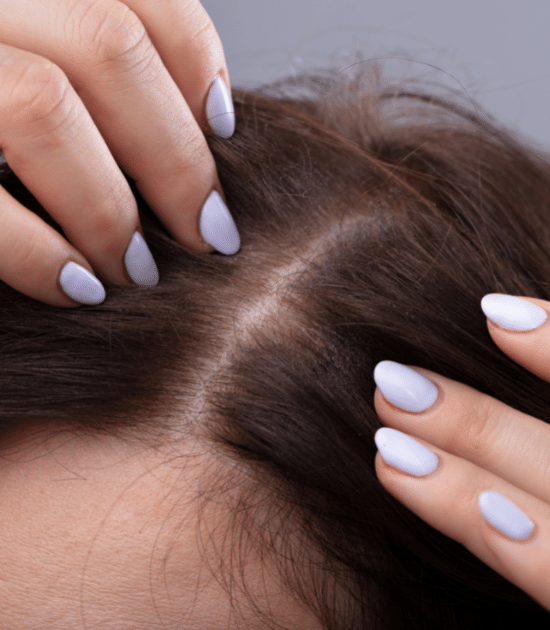
MSM is better known as the “Swiss army knife” of supplements because of its wide-ranging capabilities. For example;
- MSM helps with the activation of sulfotransferase enzymes (which are key for minoxidil to work).
- MSM decreases the expression of pro-inflammatory and pro-histamine genes. Both of which are important to improving alopecia areata, androgenic alopecia, and telogen effluvium (which often see a rise in pro-inflammatory factors).
- MSM increases antioxidant capacity by increasing glutathione, eradicating reactive species, and preventing the generation of free radicals. These mechanisms may all have relevance to androgenic alopecia, fibrosing alopecias, and telogen effluvium.
- MSM is known to donate sulfur to keratin and provide support for disulfide bonding which keeps the hair strong and healthy. Supporting the anagen phase of hair follicles.[5]https://www.naturalmedicinejournal.com/journal/2019-11/beneficial-effects-sulfur-containing-supplement-hair-and-nail-condition
- MSM may help maintain a healthy liver and gastrointestinal tract due to supporting bile acid creation. This may have an indirect relationship to hair follicles and hormone levels.[6]https://www.ncbi.nlm.nih.gov/pmc/articles/PMC3934636/[7]https://pubmed.ncbi.nlm.nih.gov/28666801/[8]https://academic.oup.com/toxsci/article/108/2/225/1664383
-

Yazen Alnouti, Bile Acid Sulfation: A Pathway of Bile Acid Elimination and Detoxification, Toxicological Sciences, Volume 108, Issue 2, April 2009, Pages 225–246.
- MSM is known to modulate the immune system in a favorable way (something of therapeutic interest for autoimmune hair loss disorders like alopecia areata).
Is there human evidence to support an MSM-hair growth connection?
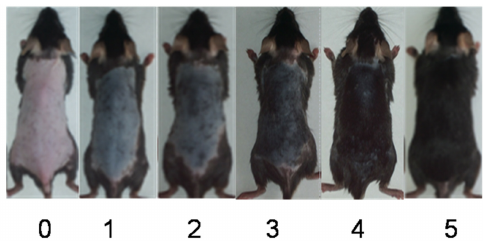
Shanmugam, Srinivasan & Baskaran, Rengarajan & Nagayya-Sriraman, Santhoshkumar & Choi, Han-Gon & Woo, Jong-Soo & Yoo, Bong-Kyu. (2009). The Effect of Methylsulfonylmethane on Hair Growth Promotion of Magnesium Ascorbyl Phosphate for the Treatment of Alopecia. Biomolecules & Therapeutics – BIOMOL THER. 17. 241-248.
Almost everything shared (so far) compromises of findings from cell culture and animal studies. Unfortunately, these models have a low translatability to humans with hair loss. For example, there are Perfect Hair health videos covering treatments and solutions touted as cures (or causes) of hair loss – only later to be refuted by clinical evidence (such as PGD2 and fluoride).
So, are there any human studies (i.e. clinical data) suggesting that MSM benefits of human health?
Yes. Here are a few studies worth highlighting.
- In this study, supplementation with 3-4g MSM for 12 weeks showed a minor but noticeable improvement in knee osteoarthritis.[9]https://pubmed.ncbi.nlm.nih.gov/21708034/
-

Debbi EM, Agar G, Fichman G, Ziv YB, Kardosh R, Halperin N, Elbaz A, Beer Y, Debi R. Efficacy of methylsulfonylmethane supplementation on osteoarthritis of the knee: a randomized controlled study. BMC Complement Altern Med. 2011 Jun 27;11:50.
- In this study, 30 days of 2.6g MSM supplementation resulted in a lessening of seasonal allergy associated inflammation. There was a minor but not very significant decrease in the allergy associated with immune signaling such as with histamine and IgE.[10]https://pubmed.ncbi.nlm.nih.gov/12006124/
- In this observational study, MSM was associated with a significantly reduced risk of colorectal cancer.[11]https://www.ncbi.nlm.nih.gov/pmc/articles/PMC2814533/
- In this trial, supplementation with 3g MSM increased HDL levels in obese individuals as compared to controls.[12]https://pubmed.ncbi.nlm.nih.gov/34684621/
-

Miller L, Thompson K, Pavlenco C, Mettu VS, Haverkamp H, Skaufel S, Basit A, Prasad B, Larsen J. The Effect of Daily Methylsulfonylmethane (MSM) Consumption on High-Density Lipoprotein Cholesterol in Healthy Overweight and Obese Adults: A Randomized Controlled Trial. Nutrients. 2021 Oct 15;13(10):3620.
- In this trial, supplementation with MSM and EDTA (a metal chelator), showed significant effects on pitting edema patients when compared to a control, in just two weeks. Because pitting edema is a disease of chronic venous insufficiency (a lack of blood flow going back to the heart), this may hold promise with respect to androgenic alopecia. The trial also showed a decrease in both oxidative stress and lipid peroxides in the MSM+EDTA group. MSM was used to get the EDTA in hard-to-reach tissues.[13]https://pubmed.ncbi.nlm.nih.gov/21366964/
- In this trial, MSM supplementation improved muscle fatigue and joint pain in marathon runners with slightly lower oxidative markers.[14]https://pubmed.ncbi.nlm.nih.gov/28736511/
- In this trial, silymarin and MSM combined improved symptoms and side effects of rosacea.[15]https://pubmed.ncbi.nlm.nih.gov/18254805/
- In a pilot study, 3g of MSM for 16 weeks improved skin aging as compared to controls.[16]https://pubmed.ncbi.nlm.nih.gov/32083522/
These findings, although not numerous as compared to the large number of in vitro studies with MSM, do strengthen the mechanisms discussed. This includes the reduction of oxidative stress with MSM, the ability to reach a wide-ranging variety of tissues, and the effects of MSM on inflammatory processes and aging processes.
Similarly, some clinical trials have suggested that with just 3g of MSM daily for a couple of weeks, hair shine, reduction of hair split ends, and general improvements in hair quality can be noticed. Further, a mice study done with MSM solutions showed that with an increasing concentration, MSM could be used as an adjunct ingredient to help get other compounds inside of cells better. Secondly, it may potentiate the effect of other hair growth-promoting agents such as magnesium ascorbyl phosphate.[17]https://www.naturalmedicinejournal.com/journal/2019-11/beneficial-effects-sulfur-containing-supplement-hair-and-nail-condition[18]https://www.researchgate.net/publication/247915887_The_Effect_of_Methylsulfonylmethane_on_Hair_Growth_Promotion_of_Magnesium_Ascorbyl_Phosphate_for_the_Treatment_of_Alopecia
Anecdotes of people who have taken MSM for hair loss have reported the following:
- One Reddit user reported thicker eyelashes and longer leg hair from taking MSM.
- A second Reddit user reported the same finding but nothing changed in terms of head hair.
- Some Reddit users have reported that combining vitamin C with collagen and applying it topically may help with collagen production. One of the features of androgenic alopecia is an improper rebuilding of collagen that is associated with the feeling of a tighter galea.
- Another Reddit user reported greater hair growth systemically from taking MSM.
- A majority of people (47%) who had taken MSM reported increased hair growth in a hair loss forum.
How can this data be interpreted?
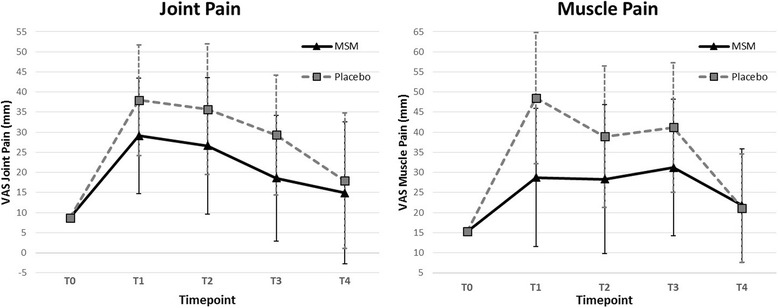
Withee ED, Tippens KM, Dehen R, Tibbitts D, Hanes D, Zwickey H. Effects of Methylsulfonylmethane (MSM) on exercise-induced oxidative stress, muscle damage, and pain following a half-marathon: a double-blind, randomized, placebo-controlled trial. J Int Soc Sports Nutr. 2017 Jul 21;14:24.
While MSM contains a plethora of support when it comes to inflammation, joint health, cardiac health, and immunity, there is a large gap in the current scientific evidence of its use for hair loss conditions like androgenic alopecia. There is no doubt that MSM may help grow hair stronger, potentially due to improvements in keratin production. However, that doesn’t necessarily mean it helps combat the miniaturization process of androgenic alopecia.
Likewise, even though MSM provides great benefits for immunity, it doesn’t necessarily target all of the immunological cascades associated with alopecia areata. Some of its targets can be beneficial in general, but it’s unlikely to combat alopecia areata fully or be considered as a therapeutic.
Based on the evidence …
Should MSM be used as an adjuvant hair loss treatment?
MSM may be a potential adjunct ingredient to include with other hair loss compounds like minoxidil and other topicals. First, it offers tissue wide penetration and can help bring key compounds to difficult-to-reach sites within the body. Second, because it contains sulfate and contributes to sulfotransferase enzyme activity, it may increase the efficacy of minoxidil or other therapies.
MSM may also be counterproductive when doing topical finasteride or dutasteride due to its ability to bring those ingredients to parts of the body like the brain and fat tissue. Combining MSM and cetirizine may improve the anti-histamine effect to help combat androgenic alopecia. It may also promote the synthesis of prostaglandin E2 preferentially, over the less wanted cousin prostaglandin D2.
For those using it, what’s the best dosage/frequency?
MSM appears to work best and is most widely studied as an oral supplement, with the dosing ranging between 1-5g per day. Some studies suggest multiple doses throughout the same day contribute to a better effect but because it can last in the body up to 12 hours, and tends to accumulate within tissues, this is likely not necessary.
Since there is also no associated toxicity after numerous tests, it’s unlikely that MSM would contribute in a negative way to health. In general, there is a tendency to not acquire enough sulfur or sulfur-like compounds within our diets.
Is oral or topical MSM best?
Although oral MSM is the most common method of administration, other studies (such as the original mice study cited at the beginning showing it potentiates magnesium ascorbyl phosphate) have shown that it works equally as a topical. Due to its ability to penetrate cells so effectively, there is likely no difference between oral or topical forms.
If individuals are utilizing hair loss compounds topically, this can prove effective for incorporating MSM into a hair loss routine.
References[+]
References ↑1 https://www.ncbi.nlm.nih.gov/pmc/articles/PMC6699852/ ↑2, ↑4 https://www.ncbi.nlm.nih.gov/pmc/articles/PMC5372953/ ↑3 https://www.ncbi.nlm.nih.gov/pmc/articles/PMC2198910/ ↑5, ↑17 https://www.naturalmedicinejournal.com/journal/2019-11/beneficial-effects-sulfur-containing-supplement-hair-and-nail-condition ↑6 https://www.ncbi.nlm.nih.gov/pmc/articles/PMC3934636/ ↑7 https://pubmed.ncbi.nlm.nih.gov/28666801/ ↑8 https://academic.oup.com/toxsci/article/108/2/225/1664383 ↑9 https://pubmed.ncbi.nlm.nih.gov/21708034/ ↑10 https://pubmed.ncbi.nlm.nih.gov/12006124/ ↑11 https://www.ncbi.nlm.nih.gov/pmc/articles/PMC2814533/ ↑12 https://pubmed.ncbi.nlm.nih.gov/34684621/ ↑13 https://pubmed.ncbi.nlm.nih.gov/21366964/ ↑14 https://pubmed.ncbi.nlm.nih.gov/28736511/ ↑15 https://pubmed.ncbi.nlm.nih.gov/18254805/ ↑16 https://pubmed.ncbi.nlm.nih.gov/32083522/ ↑18 https://www.researchgate.net/publication/247915887_The_Effect_of_Methylsulfonylmethane_on_Hair_Growth_Promotion_of_Magnesium_Ascorbyl_Phosphate_for_the_Treatment_of_Alopecia Want help with your hair regrowth journey?
Get personalized support, product recommendations, video calls, and more from our researchers, trichologists, and PhD's dedicated to getting you the best possible outcomes.
Learn More
Perfect Hair Health Team
"... Can’t thank @Rob (PHH) and @sanderson17 enough for allowing me to understand a bit what was going on with me and why all these [things were] happening ... "
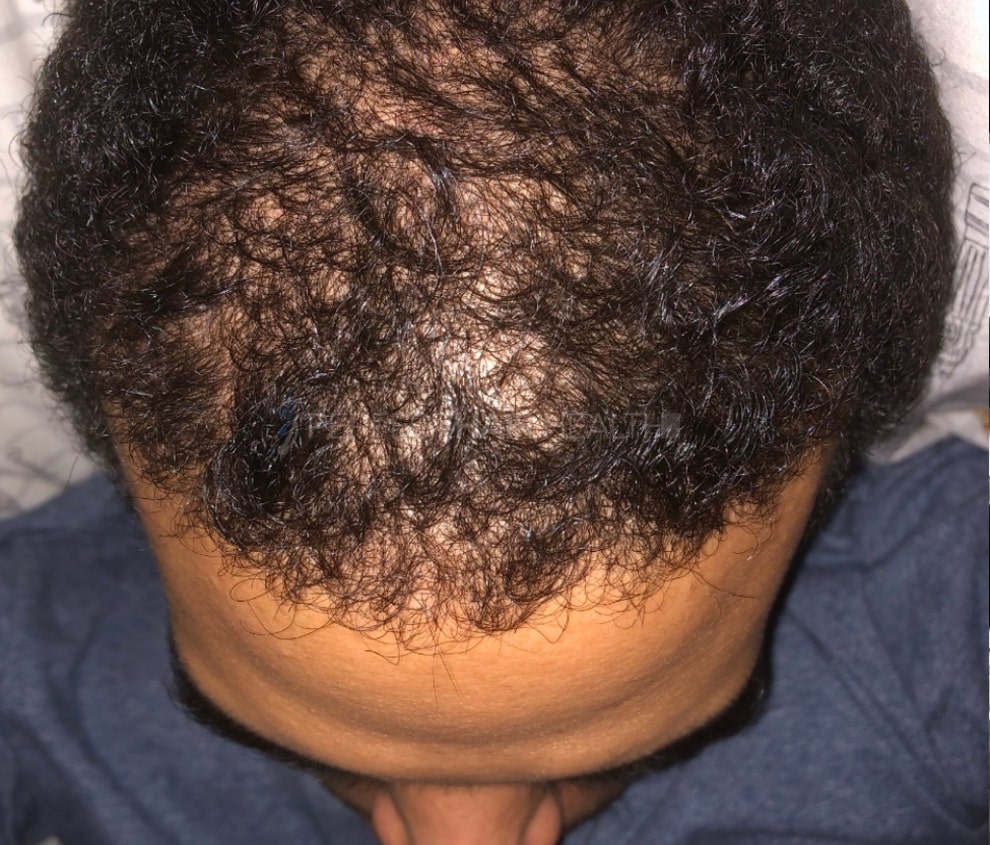
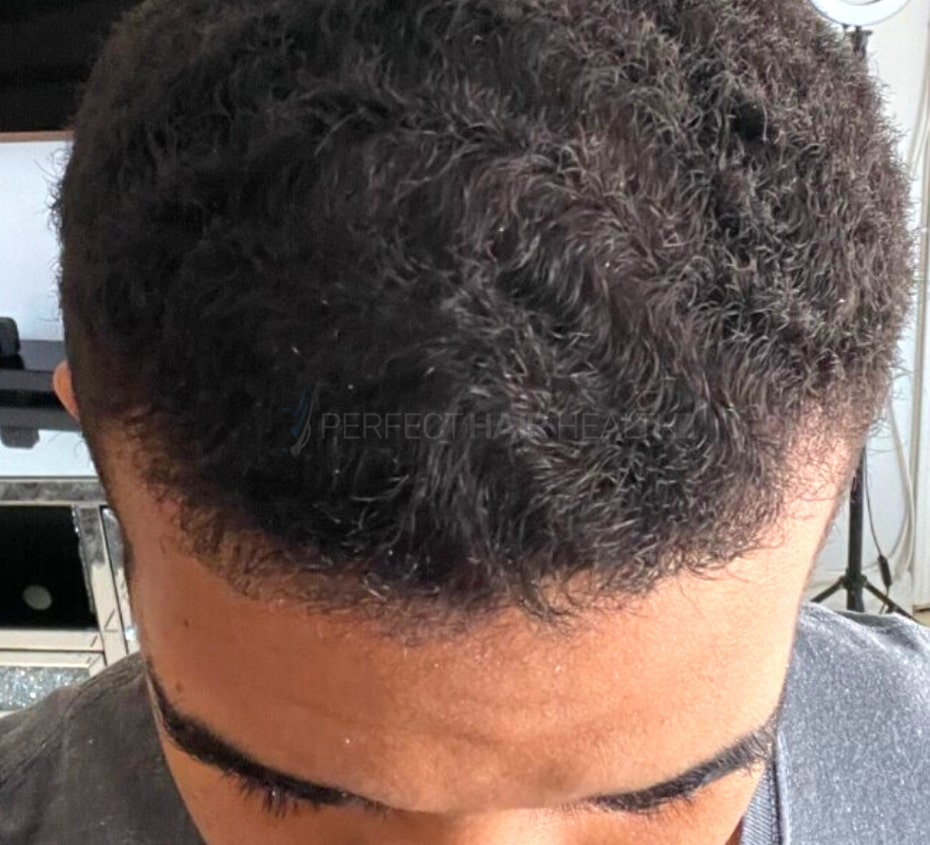 — RDB, 35, New York, U.S.A.
— RDB, 35, New York, U.S.A."... There is a lot improvement that I am seeing and my scalp feel alive nowadays... Thanks everyone. "
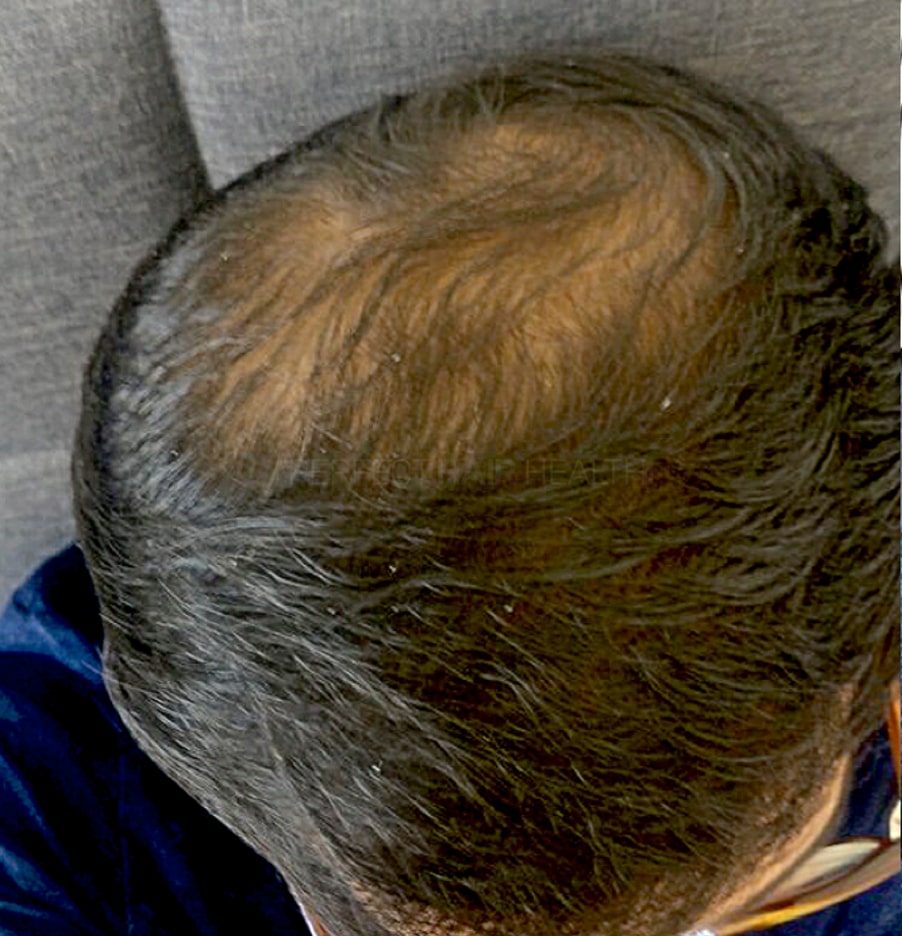
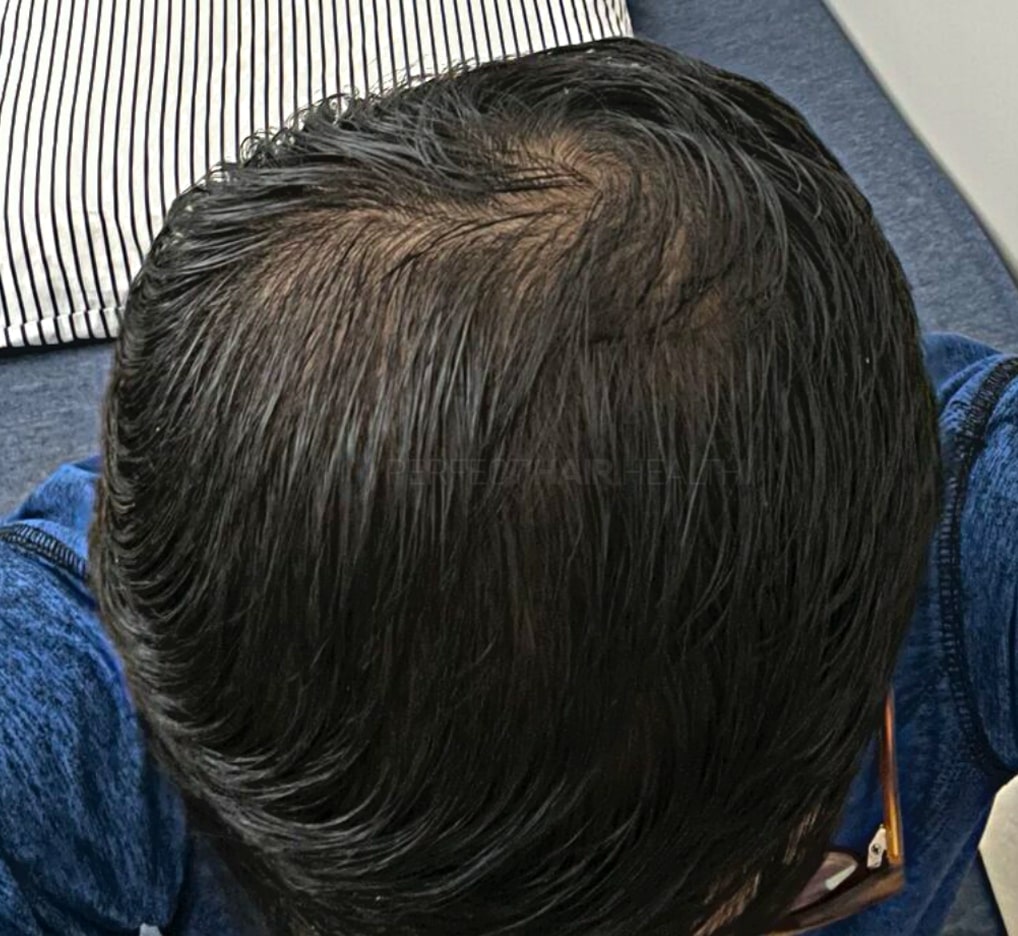 — Aayush, 20’s, Boston, MA
— Aayush, 20’s, Boston, MA"... I can say that my hair volume/thickness is about 30% more than it was when I first started."
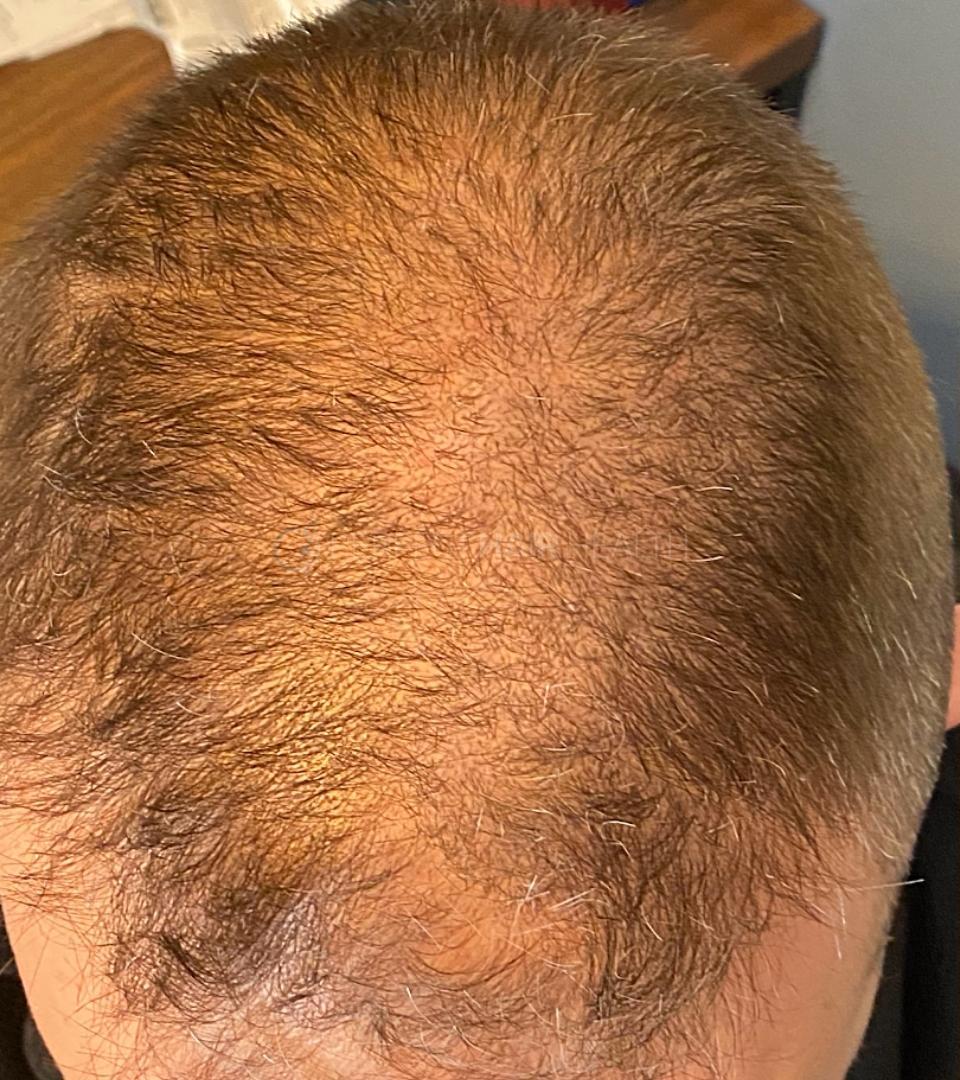
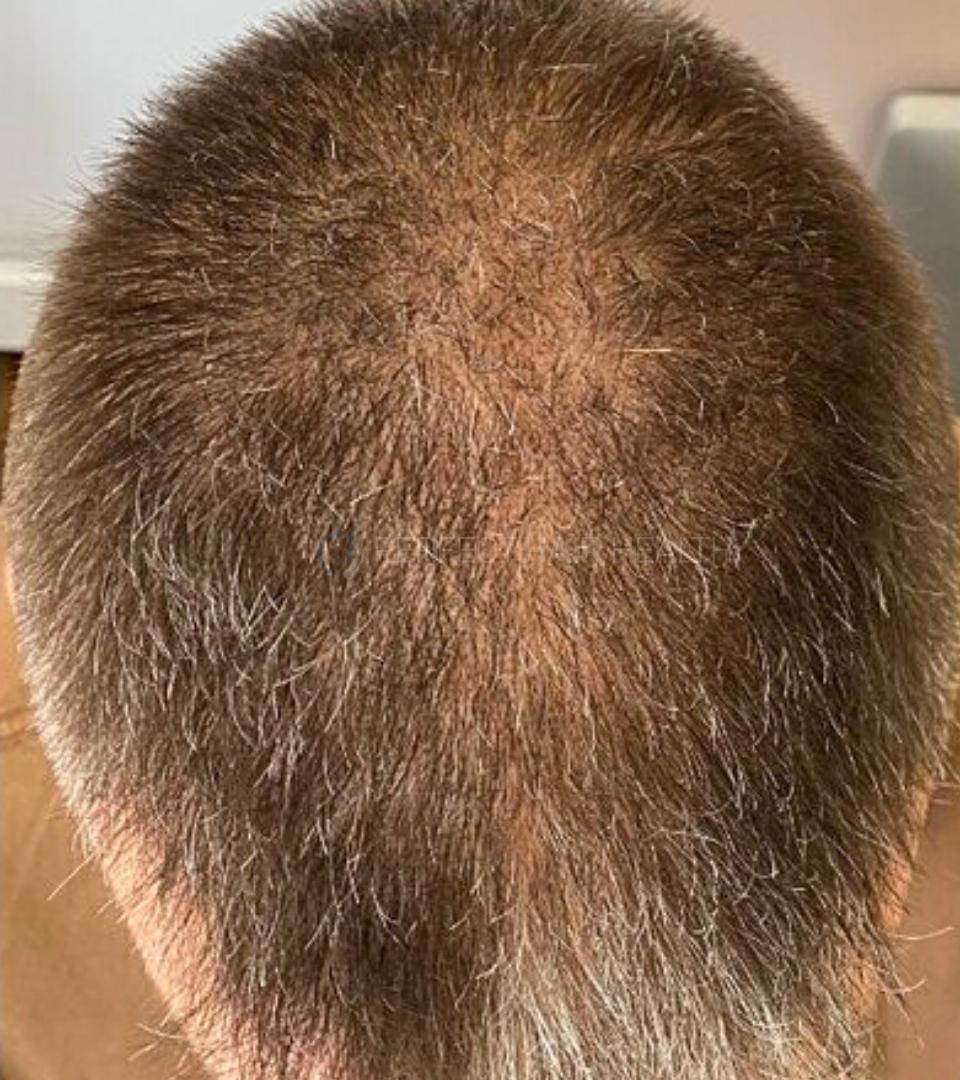 — Douglas, 50’s, Montréal, Canada
— Douglas, 50’s, Montréal, CanadaWant help with your hair regrowth journey?
Get personalized support, product recommendations, video calls, and more from our researchers, trichologists, and PhD's dedicated to getting you the best possible outcomes.
Join Now - Mission Statement